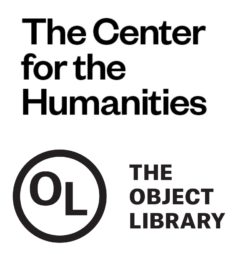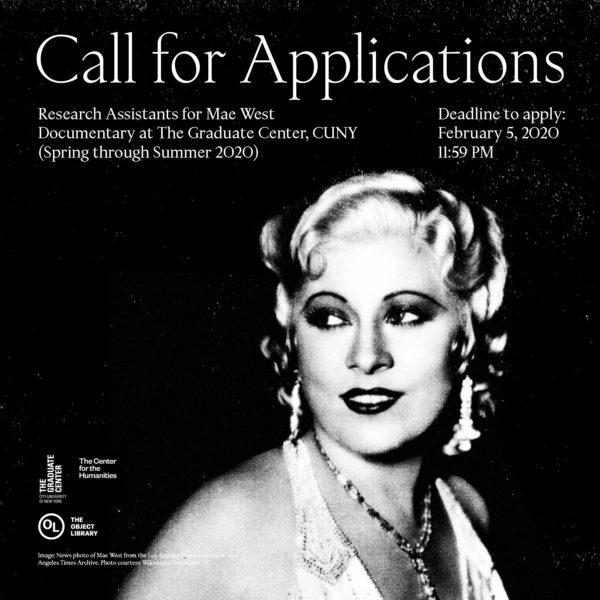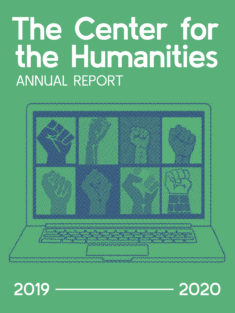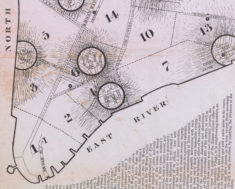About this call for research assistants
This spring, The Graduate Center, CUNY is partnering with film director Virginia Heath in the research and development phase of Mae West—The Constant Sinner, a feature-length documentary exploring Mae West’s life and influence as a wickedly subversive Hollywood star, pioneering advocate of women’s sexual freedom, transgressive playwright, trailblazing vaudeville comedienne, blues singer, and contemporary pop culture and gay icon.
We are seeking a team of highly skilled graduate student research assistants from across the disciplines to aid Heath in the research required to underpin the film’s production. The research emphasis of the film itself will be placed on the less studied Brooklyn to Broadway part of West’s career. We are seeking a team of research assistants who bring with them varied backgrounds and scholarly interests that intersect with the main themes of the film (see “central inquiries” below).
Bringing a variety of critical lenses to bear, the research undertaken will broaden an understanding of the time period and reveal the contemporary relevance of the personage of Mae West, as well as directly contributing to the making of a new hybrid “docu-fiction" film.
Deadline to Apply: February 5, 2020, 11:59 PM.
About Mae West:
Before Marilyn was a Blonde Bombshell, and Madonna was Queen of Pop, there was groundbreaking screen icon Mae West. A star who authored her own bold, provocative image—her “Diamond Lil” persona. A century before #MeToo, West pioneered the portrayal of female sexual empowerment, using it as a weapon to encourage women everywhere to take control of their own destinies.
West’s brand of whip-crack dialogue, sexual confidence, and street smarts made her the highest paid film star in 1930s Hollywood. But it also provoked the vindictive wrath of Depression-era conservative forces against her. Determined that no man was ever going to get the better of her, Mae used a potent mix of comedy and provocative sexuality in an ongoing crusade for women’s empowerment, freedom of expression, progressive values and tolerance.
Central Inquiries of this Project:
- 1920s Vaudeville—role of female performers and the rise of the comedienne; West being a deliberately provocative, taboo-busting example.
- Mae West’s “transgressive” plays—Sex, The Drag and The Constant Sinner—research the social context and controversy, any photographs, press clips, popularity with audiences versus the virulent backlash of conservative white male America.
- Link between New York in the 1920s and 2020s—"The Drag” and the so called “Pansy” Craze and Drag Balls in 1920s New York, in relation to today’s queer culture, drag, burlesque, and other gender-based performance artists in Brooklyn.
- Harlem Renaissance—West’s love of, and inspiration drawn from, African American music, including blues and jazz, which influenced the way she sang, talked, and walked.
Other avenues of inquiry will emerge directed by the collaborative research process in tandem with the director and research manager(s).
What We are Researching:
Source research materials for the film are likely to include film archives, stills archives, film posters, theatre posters, newspaper articles, magazine articles, film scripts, theatre scripts, letters to and from Mae West, Mae West memorabilia, radio shows, radio scripts, advertisements, product endorsements, producer correspondence with Hayes Committee, and contemporary stars and performers influenced by Mae West, among others.
We expect the research team to broaden out the field of research, putting the making of the film in conversation with a wide range of critical discourses.
About Virginia Heath

Virginia Heath is a multi-award winning filmmaker. She writes and directs documentary, hybrid and drama films, such as her short film, Relativity, which won the Prix UIP at the Berlinale. Her BAFTA-nominated feature-length archive and music documentary, From Scotland with Love (75’), screened with live performances of the score at the Edinburgh International Festival, Barbican Centre, and Celtic Connections, as well as at film festivals around the world. Her works have been consistently underscored with themes of social justice and individual freedom, for example My Dangerous Loverboy (2009) examined the internal sex trafficking of young girls around UK cities.
About the Film:
Mae West—The Constant Sinner will be a powerful, cinematic celebration of West as a subversive Hollywood star. It will weave together a wealth of visually evocative archive film sourced from Getty Images, Universal Studios, and other archives, along with specially shot sequences, to bring alive the vibrant atmosphere of 1920s Brooklyn where West grew up and her Diamond Lil persona was forged. Images of rough, bustling, melting pot city life, with its fast-moving, jazz-infused ambience will appear alongside the fiercely competitive world of vaudeville and Broadway. Drawing on her plays, interviews and autobiographical material, the film will explore the potential of West speaking to us “from beyond the grave” in a sly reference to Sunset Boulevard. Taking a hybrid approach (inspired by docu-fictions such as Kate Plays Christine and Casting JonBenet) to bring West alive for contemporary audiences, the film will include some key visual scenes, shot with an actress, to give us glimpses of West’s off-screen life, out of the public eye. The score will take its inspiration from the blues / jazz–infused songs she performed herself and the Harlem Renaissance and Chicago jazz clubs she frequented. Additionally, the film will explore the way in which West’s Diamond Lil persona has been adopted by drag artists, as an assertion of a bold and provocative “high fem” persona.
Responsibilities:
The chosen candidates will work directly with Heath and the project’s research manager(s) to develop a research plan, including some archival research at the New York Public Library, Library of Congress, and other repositories, as determined with the director and Center staff.
For an example of how a research team and creative practitioner can collaborate on a project, see the methodology employed to produce the film Dis-ease by the Graduate Center’s 2019–20 Wellcome Artist in Residence, Mariam Ghani:
Qualifications
Qualified candidates will have research experience and scholarly interests that intersect with the main themes of the film listed above. Must have some availability to work in the New York City area during spring and summer 2020.
To Apply:
Interested candidates should send a cover letter and brief resumé highlighting relevant experience and areas of interest to Cara Jordan at [email protected]. Please include “Mae West Research Assistant Application” in the subject of the email. Please submit applications by 11:59 PM, February 5th 2020. Interviews will take place by arrangement and the position will begin immediately thereafter.
Compensation:
Exact schedule and pay rate to be determined in direct discussion with the project directors.








